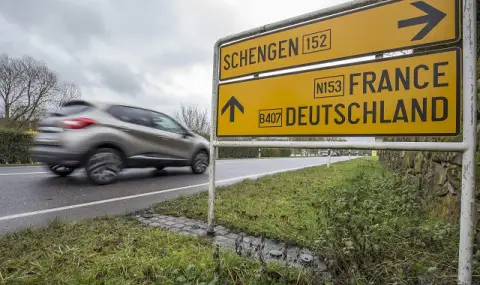Expectations before the meeting of the interior ministers of Austria, Romania and Bulgaria on the expansion of the Schengen area, which will be held on Friday in Budapest, are big, commented the news portal Oe24.at.
Austria's Minister of the Interior, Gerhard Karner, mentioned the measures taken so far to protect the external borders and emphasized: "We see that these efforts are paying off and we want to continue consistently on this path, as well as put together a new package”. Such should be agreed in Budapest, the media notes.
"After Austria and the Netherlands vetoed the accession of Romania and Bulgaria to Schengen, efforts to protect the external borders and combat criminal smuggling gained momentum," Karner continued. "Austria is not a spectator, it does the hard work itself”, he added.
Summit with Romania and Bulgaria
Apart from Karner, the Bulgarian Interior Minister Atanas Ilkov, their Romanian colleague Katalin Predoyu and the host and current President of the EU Council Hungary Sandor Pinter will take part in the working discussion in Budapest. The Hungarian Presidency of the Council of the EU wants to reach a formal agreement on the admission of Romania and Bulgaria to the Schengen area at the meeting of EU interior ministers in mid-December. The outgoing European Commissioner for Migration Ylva Johansson is expected to participate in the working discussion. Her successor, Magnus Brunner, has already spoken out in favor of both countries joining Schengen.
Preliminary intensive negotiations
The meeting in Budapest was preceded by intensive diplomatic negotiations. Romanian Prime Minister Marcel Ciolacu spoke by phone with Austrian Chancellor Karl Nehammer on Tuesday, and Romanian Senate President Nicolae Cuca met him in person on Monday. Karner received Predoyu in Vienna on Monday morning to prepare. The Austrian ambassador in Sofia, Andrea Ikic-Böhm, visited the Bulgarian-Turkish border at the beginning of the week to see the progress.
Protection of external borders
According to the Ministry of the Interior in Vienna, the official topics of the meeting in Budapest are the protection of the EU's external borders, the joint fight against human trafficking and other measures against illegal migration. Romania and Bulgaria are members of the "air Schengen” from March, meaning that air and sea border controls have now been lifted. However, full accession to Schengen will only be achieved after the opening of land borders.
Fewer and fewer illegal migrants caught
The Austrian Ministry of the Interior announced that illegal crossings at the EU border have decreased by 30%, and the route through Bulgaria and Romania to the country has significantly decreased in importance. In Bulgaria, illegal border crossings decreased by 47 percent compared to the same period last year, and asylum applications decreased by 40 percent. Romania recorded 53% fewer illegal border crossings compared to the same period last year and 75% fewer asylum applications. The fact that smugglers are avoiding Austria is particularly evident in the apprehensions at the Austrian border in Burgenland: 2,000 people were apprehended in September and October compared to 11,250 in 2023 and 28,000 in 2022.
Austria sees great progress
The Ministry of the Interior in Vienna also refers to further efforts within the EU. "Frontex“ for example, it has announced a tripling of its forces in Bulgaria, with expansion currently underway. Romania and Bulgaria have so far received 130 million euros from the European Commission to expand border surveillance. At the moment, additional personnel in the form of 1,240 border guards are being introduced in Bulgaria. Both countries are implementing pilot projects for procedures at the external borders. In addition, there are enhanced border controls and improved cooperation between the two countries with Hungary, Greece and Slovakia. Austrian police officers are also deployed as "document advisors” at the airports in Romania and Bulgaria.
"Green Light“ for Bulgaria and Romania on December 12?
Romania assumes that the EU Council of Interior Ministers will decide on the country's full accession to the Schengen area on December 12. However, the barriers at the Romanian border crossings will probably not be lifted for several months, as appropriate software programs must be implemented by then. He "firmly expects that Romania will become a full Schengen member by Easter 2025”, Çolaku said recently.
For the MEP from the Social Democratic Party of Austria, Hannes Heide, the expansion of the Schengen area is long overdue: "It is high time to finally cancel the Schengen veto, which has caused Austria considerable image and economic damage. The requirements for Schengen admission have long been fulfilled by Romania and Bulgaria, Heide emphasized.
The veto falls? Austria on track to let Bulgaria into Schengen
After Austria and the Netherlands vetoed Romania and Bulgaria's entry into Schengen, efforts to protect external borders and combat criminal smuggling gained momentum
Nov 21, 2024 20:50 435
